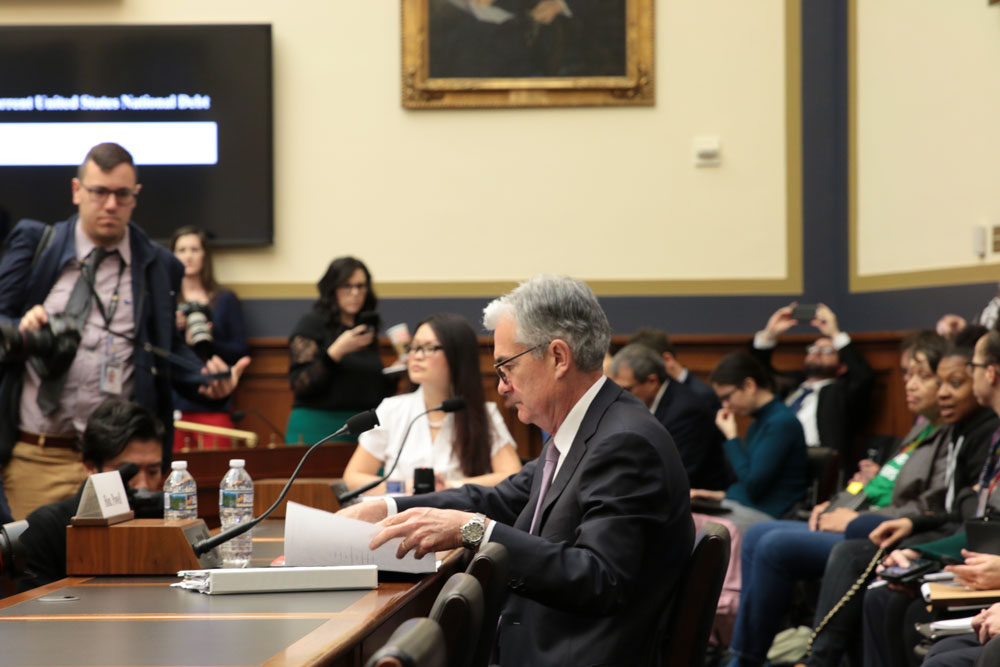Federal Reserve Chair Jerome Powell, who was sworn in last month, provided three hours of testimony before Congress on Feb. 27, in a hearing titled “Monetary Policy and the State of the Economy.”
“So what?” you might say.
Because the Federal Reserve is an obscure, mysterious body, few of us understand who Powell is or what he does. Well, we should all care. This position, a four-year presidential appointment, leads the Federal Reserve. And the Fed sets interest rates, determining everything from the value of our money to the unemployment rate and the average wage paid to workers.
We all feel the effect of the Fed’s policies if the economy slows down and it becomes harder to apply for a job, get a loan or ask your boss for a raise. The Fed oversees everything from your mortgage interest rate, which it directly controls, to whether banks are loaning in certain neighborhoods where homeowners have lower incomes.
In other words, our financial wherewithal, as individuals, communities and as a nation, is pegged to the terms set by the Federal Reserve.Their actions can, have and still do have an impact on racial and gender discrimination in America.
Fed Up, a national coalition, and local members of SPACES D.C., including myself, showed up in our signature “Full Employment Defender” shirts to attend Powell’s hearing. We are fondly known as the “green shirts” by members of Congress and are recognized for our attendance at many Federal Reserve events, protests, non-violent demonstrations and educational outreach activities.

“When everyday people, low-wage workers, have a presence in the halls of power to demand better jobs and higher wages, it makes a huge impression on economic policymakers,” said Jordan Haedtler, campaign manager for the Fed Up coalition.
Rep. Al Green (D-TX) used his time to ask Powell what unemployment rate he considered to be “full employment” in the United States. Between 3.5 and 5 percent, Powell answered. “6.8 percent seems to be the lowest [Black unemployment] number that I could find since we’ve been keeping numbers,” Green said. “And for 47 of the last 54 years, it’s always been twice that of White unemployment.”
Powell agreed that this amounted to damaging or hostile discrimination. Green asked, given these facts, what will be done to address inequality in unemployment and lending opportunities between Black and White people.
“That which we will tolerate, we will not change. We have learned to tolerate African American unemployment being twice that of White unemployment. I refuse to tolerate it,” Green said, stressing that not just the Fed but Congressional Democrats and Republicans all need to step up their work to address Black unemployment.

Rep. Gwen Moore (D-WI) followed Green’s line of questioning by noting that, according to the United Nations, the United States is on track to be the most unequal country in the world.
“It’s a big, very complicated set of issues, and I’ll just point to a couple of things,” Powell said. “The first is that we’ve seen a stagnation of middle-class, median incomes. And that seems to be closely tied to the flattening out of educational attainment and skills attainment by our workers. And I think we need to have the best trained workforce and the most highly educated workforce.”
Rep. Maxine Waters (D-CA), vice chair of the Committee on Financial Services, challenged the Fed’s internal commitment to diversity. She noted that the president of the Federal Reserve Bank of New York will step down this year and said this is one of the most powerful economic policymaking positions in the country because of proximity to Wall Street and the New York president’s added role as a permanent voting member of a very influential Federal Reserve committee. Waters asked whether Powell would be prepared to use his authority to veto candidates who are too connected with Wall Street or not from a diverse set of race, gender and ethnic backgrounds.
“We have got to do better about diversity, in particular at the highest levels,” Waters said.
Powell said that a firm is hired to seek out candidates and that diverse candidates are given every opportunity to succeed. “I cannot in any individual case guarantee that there will be a diverse outcome,” he said. “But I can guarantee that the process will always be working in that direction.”
Waters said she would follow up to learn which minority financial-services organizations have been contacted by search firms and to refer such groups. Powell agreed to help.
I’m grateful to our representatives for prioritizing inequality and diversity in leadership. As the new Fed Chair gets to work, I, along with the Fed Up coalition, will be watching.








